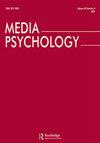Harming and Shaming through Naming: Examining Why Calling the Coronavirus the “COVID-19 Virus,” Not the “Chinese Virus,” Matters
IF 2.6
2区 心理学
Q1 COMMUNICATION
引用次数: 13
Abstract
ABSTRACT In an effort to stave off racial and geographic prejudices, The World Health Organization (WHO) has advised against naming pathogens for geographic regions. Despite this, some media reports, and prominent politicians, have persisted in calling the coronavirus the “Chinese Virus,” or some variant thereof. In this pre-registered online experiment (N = 614), we examined the effect media frames and individual factors (i.e., political affiliation and party) had on perceptions of COVID-19, prejudice against Chinese- and Asian-Americans, and attributing blame to China for the coronavirus. We found that articles that labeled the coronavirus the “Chinese Virus” (versus the “COVID-19 Virus”) were perceived less favorably by Democrats and liberals, in comparison to Republicans and conservatives, who were also more likely to express greater racial prejudice against Chinese- and Asian-Americans and to blame China for the pandemic. Findings from this study suggest that amongst a host of other variables, media framing has an effect on the public’s attitudes and feelings of blame for the pandemic.通过命名来伤害和羞辱:研究为什么将冠状病毒称为“COVID-19病毒”而不是“中国病毒”很重要
为了避免种族和地理偏见,世界卫生组织(WHO)建议不要用地理区域来命名病原体。尽管如此,一些媒体报道和知名政客仍坚持将新冠病毒称为“中国病毒”或其变体。在这个预先注册的在线实验中(N = 614),我们研究了媒体框架和个人因素(即政治派别和政党)对COVID-19的看法、对华裔和亚裔美国人的偏见以及将冠状病毒归咎于中国的影响。我们发现,与共和党人和保守派相比,民主党人和自由派人士对将冠状病毒标记为“中国病毒”(而不是“COVID-19病毒”)的文章不太好感,共和党人和保守派也更有可能对华裔和亚裔美国人表达更大的种族偏见,并将疫情归咎于中国。这项研究的结果表明,在许多其他变量中,媒体框架对公众对流行病的态度和指责感产生了影响。
本文章由计算机程序翻译,如有差异,请以英文原文为准。
求助全文
约1分钟内获得全文
求助全文
来源期刊

Media Psychology
Multiple-
CiteScore
8.60
自引率
7.10%
发文量
30
期刊介绍:
Media Psychology is an interdisciplinary journal devoted to publishing theoretically-oriented empirical research that is at the intersection of psychology and media communication. These topics include media uses, processes, and effects. Such research is already well represented in mainstream journals in psychology and communication, but its publication is dispersed across many sources. Therefore, scholars working on common issues and problems in various disciplines often cannot fully utilize the contributions of kindred spirits in cognate disciplines.
 求助内容:
求助内容: 应助结果提醒方式:
应助结果提醒方式:


